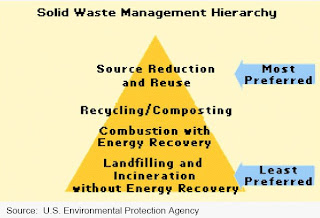Here are some questions and answers that may help in understanding recycling. Much of this information was found at the U.S. Environmental Protection Agency website:
Q. What exactly is recycling?
A. Recycling is processing old, or previously used, materials that would have been thrown in the trash and making new products from them.
Q. What are the benefits of recycling?
A. Recycling conserves our resources while also reducing the need for more landfills and incinerators. It saves energy, supplies valuable materials to our industry, and prevents a lot of air and water pollution. Recycling also creates more jobs because of the programs that are needed!
Q. Is recycling the best thing that I can do to reduce waste?
A. No. The EPA has a solid waste management hierarchy (see figure 1) which says we need to reduce, reuse, recycle. The best thing that we can do is to reduce. The best way to manage waste is to never create it in the first place, or create as little of it as we can. Make sure you need what you buy and try to avoid excessive packaging. Reuse is part of reduce. Look for opportunities to reuse the containers that you have. Try rinsing out juice cartons and using them again! However, we can't reuse everything and that is where recycling comes in. Landfills or incineration should be used as little as possible.
Figure 1: 
Q. If there is still landfill space, why should I recycle?

Q. If there is still landfill space, why should I recycle?
A. Eventually landfills will fill up, it's only a matter of time. Recycling not only prolongs the time we have until they are filled up, but it also generates valuable revenue for Utah and for the United States through selling recycled materials.
Q. What materials are appropriate to recycle?
A. The most commonly recycled materials are: plastic, paper, glass, aluminum, steel, batteries, motor oil, and tires. Find out here how to sort your household materials into these groups.
Q. What are some hazardous materials that I may have around the house and how should I dispose of them?
A. Products such as paints, cleaners, oils (especially motor oil), batteries, and pesticides are hazardous materials that most people have in their homes. These materials are referred to as Household Hazardous Waste (HHW). Do not under any circumstances pour these materials down the drain or on the ground and do not throw them in the trash. These materials cause severe damage to human health as well as our environment over time. Each county in Utah has a way to dispose of these materials with either a permanent collection facility or a special collection day. If your city does not have either of these options, there may be businesses which accept the materials for recycling or disposal. Please check with your community for more details on these programs.
A. There are two ways that biodegradable substances can break down: aerobically (with oxygen) or anaerobically (without oxygen). Landfills are so tightly packed that the materials are not exposed to oxygen and therefore must go through anaerobic decomposition. No problem, right? Wrong. Because there is no exposure to oxygen, the materials break down differently and this causes the release of excess greenhouse gases. Anaerobic decomposition also takes much longer than aerobic. Researchers from the University of Arizona uncovered 50-year-old newspapers that were still readable as well as recognizable hot dogs, corncobs, and grapes. Yuck!
Q. How does recycling save energy?
A. processing raw materials is a long process and requires large amounts of energy. Recycling eliminates this need because the recycled materials have already been processed! In 2005 the United States was estimated to conserve the annual energy use of 9 million households just through recycling.
Q. Why don't more cities in Utah have recycling programs?
A. There is a lot of effort that goes into establishing a new city recycling program. According to Green Team Utah it takes a large amount of educational materials and funds to teach the public how to correctly use a new recycling program. And in this economy many cities are opting to use those funds towards other programs.
Q. How can I start or help support a recycling program?
A. Most cities have a recycling coordinator. Look in your phone book under "recycling coordinator" to contact them. Or contact your local department of sanitation.
